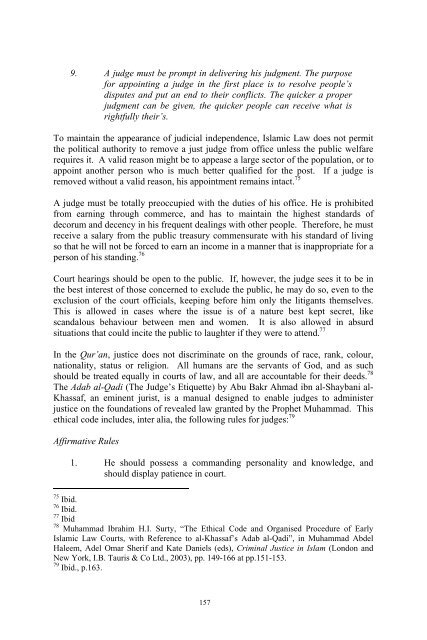publications_unodc_commentary-e
publications_unodc_commentary-e
publications_unodc_commentary-e
- No tags were found...
You also want an ePaper? Increase the reach of your titles
YUMPU automatically turns print PDFs into web optimized ePapers that Google loves.
9. A judge must be prompt in delivering his judgment. The purposefor appointing a judge in the first place is to resolve people’sdisputes and put an end to their conflicts. The quicker a properjudgment can be given, the quicker people can receive what isrightfully their’s.To maintain the appearance of judicial independence, Islamic Law does not permitthe political authority to remove a just judge from office unless the public welfarerequires it. A valid reason might be to appease a large sector of the population, or toappoint another person who is much better qualified for the post. If a judge isremoved without a valid reason, his appointment remains intact. 75A judge must be totally preoccupied with the duties of his office. He is prohibitedfrom earning through commerce, and has to maintain the highest standards ofdecorum and decency in his frequent dealings with other people. Therefore, he mustreceive a salary from the public treasury commensurate with his standard of livingso that he will not be forced to earn an income in a manner that is inappropriate for aperson of his standing. 76Court hearings should be open to the public. If, however, the judge sees it to be inthe best interest of those concerned to exclude the public, he may do so, even to theexclusion of the court officials, keeping before him only the litigants themselves.This is allowed in cases where the issue is of a nature best kept secret, likescandalous behaviour between men and women. It is also allowed in absurdsituations that could incite the public to laughter if they were to attend. 77In the Qur’an, justice does not discriminate on the grounds of race, rank, colour,nationality, status or religion. All humans are the servants of God, and as suchshould be treated equally in courts of law, and all are accountable for their deeds. 78The Adab al-Qadi (The Judge’s Etiquette) by Abu Bakr Ahmad ibn al-Shaybani al-Khassaf, an eminent jurist, is a manual designed to enable judges to administerjustice on the foundations of revealed law granted by the Prophet Muhammad. Thisethical code includes, inter alia, the following rules for judges: 79Affirmative Rules1. He should possess a commanding personality and knowledge, andshould display patience in court.75 Ibid.76 Ibid.77 Ibid78 Muhammad Ibrahim H.I. Surty, “The Ethical Code and Organised Procedure of EarlyIslamic Law Courts, with Reference to al-Khassaf’s Adab al-Qadi”, in Muhammad AbdelHaleem, Adel Omar Sherif and Kate Daniels (eds), Criminal Justice in Islam (London andNew York, I.B. Tauris & Co Ltd., 2003), pp. 149-166 at pp.151-153.79 Ibid., p.163.157


